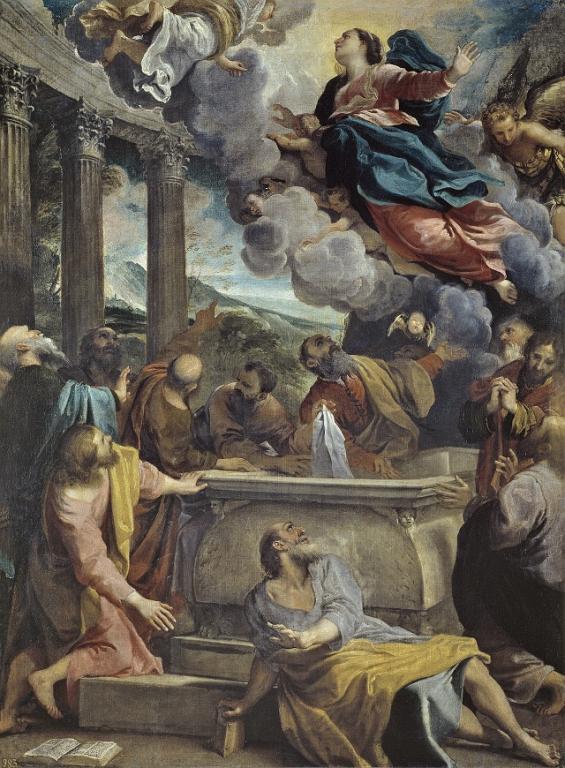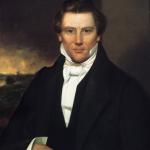(vs. Bishop “Dr.” [???] James White)

James White runs the Alpha and Omega Ministries website, perhaps the most extensive anti-Catholic critique of Catholicism on the Internet, and has written several books against the Church, including The Roman Catholic Controversy (Minneapolis: Bethany House Publishers, 1996). He earned an M.A. in Theology from Fuller Theological Seminary. His words will be in blue.
***
Contrary to you guys, we hold that all Christian doctrines are important, and to be preserved with the utmost care and reverence.
Again, that cuts both ways.
James, c’mon! You guys obviously don’t care about the importance of all doctrines equally, by the very nature of Protestantism and perspicuity, and the compromised necessity which many hundreds of sects presses upon you. You have sought to produce a counter-example here, but “all” doctrines? It just ain’t so!
It seems that in point of fact, it’s a matter of “those doctrines that we have decided, over the process of time, and often times due to mere historical considerations rather than any apostolic mandate, are important and we insist everyone believe in them. But on those issues where we haven’t made up our mind, well, those items really aren’t that important.”
The result of this is that the Roman Catholic believes that the Bodily Assumption of Mary is something that must be accepted; but you can hold all sorts of views on whether God is sovereign in the matter of salvation and what that means, and that’s okay.
Mary’s Assumption is important because it is intimately related to (and flows from the consequences of) her Immaculate Conception, which has considerable scriptural support (yes, mostly deductive and implicit). The Immaculate Conception, in turn, is necessary by virtue of Mary being the Theotokos; all of Mariology being subsumed under the category of Christology, and Christ-centered always in Catholic theology and dogmatic pronouncements. Christology (particularly the Incarnation and Virgin Birth in this case) is very important, as I think all here would agree. I know you won’t buy this reasoning process because it is foreign to you, but please try to understand the Catholic Church’s rationale for what it does.
This Christ-centeredness is seen in the history of the Church. First, the Trinity was defined (Nicaea, 325), then the Divinity of the Holy Spirit (Constantinople, 381). At the Council of Ephesus in 431 Theotokos was defined because the fullness of Christ’s divinity was questioned by the Nestorians (virtually all reputable Protestant church historians readily agree with this interpretation). Once the Christological definitions were hammered out, Mariology developed much more rapidly, but they were still Christological in the sense of the Theotokos definition of 431. And that’s why all Marian doctrines are important, Protestant protestations (which is well-nigh your essence, it often seems) notwithstanding.
Now I think everyone can see that the Bodily Assumption is a non-biblical doctrine, defined on the basis of “tradition,” whatever that might be.
It is not explicitly stated, as all agree, but implicitly, in the sense of being, e.g., deduced from the Immaculate Conception, and the notions of resurrection and the consequences of death due to original sin, yes, it is biblical. Thus it is not “non-biblical,” as are, e.g., sola Scriptura and the canon of the NT. Nor is it at all intrinsically contrary or “foreign” to the overall teachings of Scripture (it involves no violation of biblical teachings per se, whether one questions its actuality or not).
I hope no one would actually argue that the Apostles taught this doctrine to the Thessalonians (2 Thess. 2:15) and that it was passed down through the ages until defined not so long ago.
It is part of Divine, public Revelation, which ceased with the Apostles, yes. It is the most difficult Catholic doctrine to find in the earliest centuries, I admit (how’s that for honesty?), but not an insurmountable obstacle, as are so many of Protestant difficulties.
That kind of argument is too easily refuted.
As are many, many Protestant arguments!
So we have a doctrine that was defined on the basis of ecclesiastical authority, made binding upon all people,
This is precisely the case with the NT canon, yet you guys accept that (from us, by the way) without any qualms or doubts, not even the slightest. Is this not inconsistent?
that is not to be found even “implicitly” in Scripture.
Ah, but it is. All things work together . . .
Yet a Roman Catholic has “certainty” about this doctrine, because his/her ultimate authority says “believe this.”
Yeah, when the true Church of Jesus Christ proclaims something as true, I believe it, just as when your master Calvin, or the Westminster Confession, or whatever authority you choose to adhere to, says something, you believe it, or if you dissent on a particular, you place yourself above Calvin or the Confession, and become your own pope, in effect infallible (if not, then your belief is somewhat arbitrary, isn’t it?). You act as if all authority is somehow a priori unacceptable, which is an impossible position to maintain without lapsing into skepticism, even perhaps solipsism. And don’t neglect the place of faith, either, which obviously cannot be reduced to mere reason or whim.
I have found it most strange that Roman Catholics are continually griping about such dogmas as the Immaculate Conception and Bodily Assumption of Mary, and Papal Infallibility, being used to “beat” them over the head. I’ve had more than one apologist say, “Hey, I didn’t bring up those irrelevant topics, White did!” And I normally just sit there scratching my head. Why? Because I’d think the relevance is too obvious to be questioned.
In passing, as examples for the sake of argument, sure, but not in depth at this point, as the ostensible topic is “Re: the existence of (oral) tradition in the NT.” Clearly, the very presence of Anglicans and Orthodox and Lutherans in this group presuppose that there are representatives here who espouse some sort of tradition not identical with Catholic Tradition.
These are [not] the only examples of your “Sacred Tradition” we can come up with. They are doctrines that are manifestly not a part of the biblical record;
“Manifestly”? Speak for yourself.) An absolutely indisputable example of that would be, rather, the Canon of the NT, which you accept as a “gift” from the Tradition of your Catholic forefathers.
they are manifestly not a part of the beliefs of the early Church,
As you insist on this digression, I toss out just one example of a Marian doctrine present in “kernel” form (at the very least) in the Fathers (in this case, from the 4th century):
You alone and Your Mother are good in every way; for there is no blemish in Thee, my Lord, and no stain in Thy Mother. (St. Ephraem, Nisibene Hymns, 27:8)
O virgin lady, immaculate Mother of God, my lady most glorious, most gracious, higher than heaven, much purer than the sun’s splendor, rays or light . . . you bore God and the Word according to the flesh, preserving your virginity before childbirth, a virgin after childbirth. (St. Ephraem, “Prayer to the Most Holy Mother of God”)
(cited from Hilda Graef, Mary: A History of Doctrine and Devotion [London: Sheed & Ward, 1965] )
At this point of Church history (before 373), you’ll recall, neither the Divinity of the Holy Spirit, nor the Two Natures of Christ were fully developed or dogmatically defined in Council. Yet you would deny the legitimacy of Marian dogmatic developments – hardly a coherent position.
and yet they are dogmas that Rome claims to have the authority to define and to make binding upon every Christian! Here is your “Tradition” in full and living color,
Yes, no kidding, but of what direct relevance are they to the topic at hand?
and hence how can we not bring these things up? What other examples would you like us to focus upon?
I thought we were trying to follow a strict topical guideline [sola Scriptura], per your instructions, “The New Order.” Are we now going to digress into Marian doctrine, rather than hammer out one proposition at a time? Again, passing references are fine, but they must be limited in scope, or else chaos will reign once again in this group. I have stated that I would be happy to take on these objections at an appropriate future time. I even offered to host another discussion group on such things.
***
(originally from June 1996 on James White’s sola Scriptura e-mail discussion list)
Photo credit: Assumption of Mary (c. 1590), by Annibale Carracci (1560-1609) [public domain / Wikimedia Commons]
***













